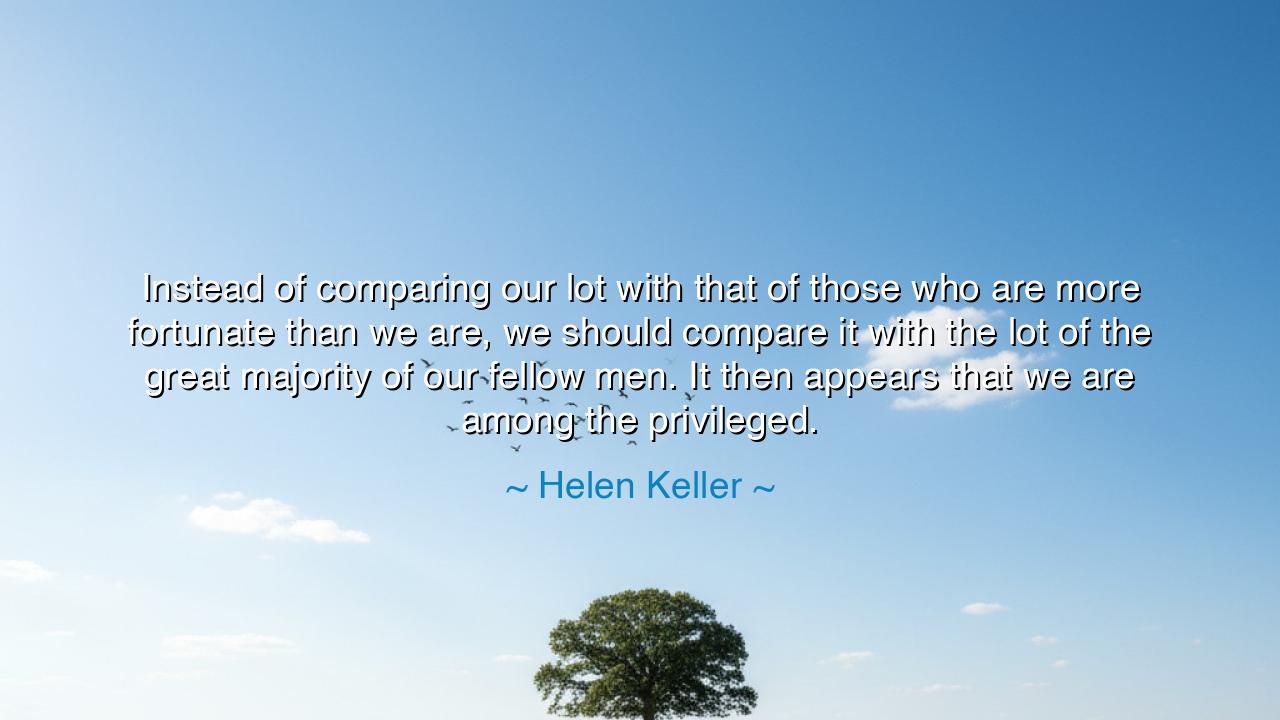
Instead of comparing our lot with that of those who are more
Instead of comparing our lot with that of those who are more fortunate than we are, we should compare it with the lot of the great majority of our fellow men. It then appears that we are among the privileged.






"Instead of comparing our lot with that of those who are more fortunate than we are, we should compare it with the lot of the great majority of our fellow men. It then appears that we are among the privileged." – Helen Keller
So spoke Helen Keller, a woman who lived in darkness and silence yet saw and heard more truth than most who walk in the full light of day. When she said, “Instead of comparing our lot with that of those who are more fortunate than we are…”, she was not merely offering comfort to the discontented — she was teaching a discipline of the soul, a way of seeing that transforms bitterness into gratitude. For she knew, through her own life of hardship, that gratitude is not the fruit of circumstance, but of vision — the inner sight that recognizes abundance even where others see only lack.
The origin of this quote lies in the heart of Helen Keller’s lifelong philosophy — one forged through adversity. Deaf and blind since infancy, she was thrust into a world of silence and darkness. Yet guided by her teacher and companion Anne Sullivan, she learned to speak, to write, and to think with a clarity that astonished the world. She traveled across continents, championing the rights of the disabled, the poor, and the oppressed. And through it all, she never envied those who had what she lacked. Instead, she cultivated a deep awareness of her blessings — friendship, education, purpose — and saw herself as privileged, not deprived. Her words remind us that true wealth lies not in possessions or ease, but in the ability to recognize the miracle of what we already have.
Keller’s teaching echoes a wisdom as old as the human heart. The ancients, too, warned against the poison of comparison. The Stoic philosophers, such as Epictetus and Seneca, taught that discontent arises not from poverty, but from coveting what others possess. They urged mankind to measure life not by what is missing, but by what remains. Helen Keller, through the lens of her own suffering, revived this eternal truth for the modern soul. She taught that when we look upward toward those with greater fortune, we invite envy and despair; but when we look outward, toward the great multitude who struggle with less, we awaken compassion — and with it, humility.
Consider the countless millions who live without food, safety, or love. Think of the child who works instead of learns, the mother who prays over an empty table, the refugee who sleeps beneath the open sky. To remember them is not to wallow in guilt, but to awaken perspective. It is to realize that much of what we call burden is, to others, a dream beyond reach. When Keller said we are “among the privileged,” she did not speak to shame us — she spoke to elevate our gratitude and to remind us of our duty. For privilege, rightly seen, is not a mark of superiority but a call to responsibility — to use our comfort, our freedom, and our knowledge in service of those who have less.
Her wisdom can be seen in every age. During the Great Depression, when millions lost their homes and livelihoods, those who endured with dignity were often those who remembered that even hardship did not erase the essentials of life — family, love, and the will to hope. Likewise, in times of war or crisis, it is gratitude — the recognition that life itself is a gift — that gives people strength. Helen Keller’s words are thus not sentimental, but heroic: they are a command to shift our gaze from envy to empathy, from longing to appreciation, from complaint to action.
To live by her teaching is to cultivate a spiritual vision, a second sight that sees the invisible blessings that surround us. When you wake in the morning, she would say, do not begin by thinking of what you lack — think of what you have: breath, shelter, memory, love. Let gratitude steady your heart before you face the world. And then, let that gratitude move you to give, to serve, to make the world gentler for those who cannot yet see its light. For gratitude that does not blossom into generosity remains incomplete.
So remember, my child of restless spirit: comparison is the thief of joy, but gratitude is its guardian. When envy whispers that others are more fortunate, answer with the calm of perspective: that in a world of hunger, to have food is wealth; in a world of loneliness, to have one friend is treasure; in a world of despair, to possess hope is royalty. Let this be your daily practice — to count not what is missing, but what is present, and to let that awareness guide your steps in compassion. For as Helen Keller taught by her radiant example, those who see life with the eyes of gratitude are already living among the truly privileged.






AAdministratorAdministrator
Welcome, honored guests. Please leave a comment, we will respond soon